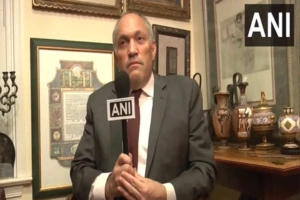Introduction
In the wake of the deadly Pahalgam Terrorist Attack in Jammu and Kashmir, former US Pentagon official Michael Rubin delivered a scathing critique of Pakistan’s alleged role, using the phrase “You can put lipstick on a pig, but it’s still a pig” to dismiss any claims that the attack was a spontaneous act. The remarks come amid growing diplomatic tensions between India and Pakistan and escalating global scrutiny over Islamabad’s terror affiliations.
Ex-Pentagon Official Compares Pakistan Army Chief to Bin Laden
Michael Rubin, currently a senior fellow at the American Enterprise Institute (AEI), did not hold back in his condemnation. In an interview with ANI, Rubin drew a provocative comparison between Pakistan’s Army Chief General Asim Munir and Osama Bin Laden, the former Al-Qaeda leader.
“The only difference between Osama Bin Laden and Asim Munir is that Osama lived in a cave and Munir lives in a palace. Beyond that, the two are the same—and their end should also be the same,” Rubin stated.
He further called on the United States to designate Pakistan as a state sponsor of terrorism, and Asim Munir as a global terrorist, citing direct involvement and strategic oversight in cross-border terrorist operations like the one in Pahalgam.

“Pahalgam Terrorist Attack Not Spontaneous,” Says Rubin
Rubin dismissed any narrative that the Pahalgam Terrorist Attack was an impulsive or locally driven incident. Instead, he suggested the timing was deliberate, potentially orchestrated to overshadow the high-profile visit of US Vice President JD Vance to India.
“Just like there was a terrorist attack when President Clinton visited India, Pakistan appears to be following the same playbook—divert attention, provoke, and derail diplomatic progress.”
India’s Diplomatic Crackdown on Pakistan
Following the tragic attack that killed 26 civilians at Baisaran meadow, the Indian government has announced a series of retaliatory diplomatic steps:
Key Measures Taken:
- Expulsion of all Pakistani military attachés from India
- Suspension of the Indus Waters Treaty of 1960
- Closure of the Attari land transit post
- Reduction of high commission staff strength from 55 to 30 for both nations
- Termination of SAARC Visa Exemption Scheme for Pakistani nationals
- 48-hour deadline for current Pakistani SVES visa holders to leave India
- Persona non grata designation for Pakistani military, naval, and air advisors stationed in New Delhi
India’s Foreign Secretary Vikram Misri stated that these actions are “measured, proportionate, and necessary” in light of the cross-border terror threat.
International Fallout and Global Attention
Rubin’s remarks, especially given his position as a former senior US official, are likely to add to the international pressure on Pakistan, which is already grappling with FATF grey list threats, rising economic instability, and diminished global credibility on counterterrorism.
The use of the “lipstick on a pig” analogy has drawn sharp reactions from geopolitical analysts, with many interpreting it as a firm rejection of Pakistan’s diplomatic justifications and a call for greater accountability on the global stage.
Links Suggested: India-Sri Lanka Relations : 5 Strategic Wins for Both Nations
Conclusion: A Tipping Point?
As the bodies of the Pahalgam Terrorist Attack victims return home, grief has now turned into a rallying cry for justice. India’s bold diplomatic measures, combined with voices like Rubin’s from across the Atlantic, reflect a growing international consensus that Pakistan must face consequences for its support—direct or indirect—of terror activities.
Whether this incident proves to be a turning point in global policy toward Pakistan remains to be seen, but one thing is certain: the world is watching more closely than ever before.

